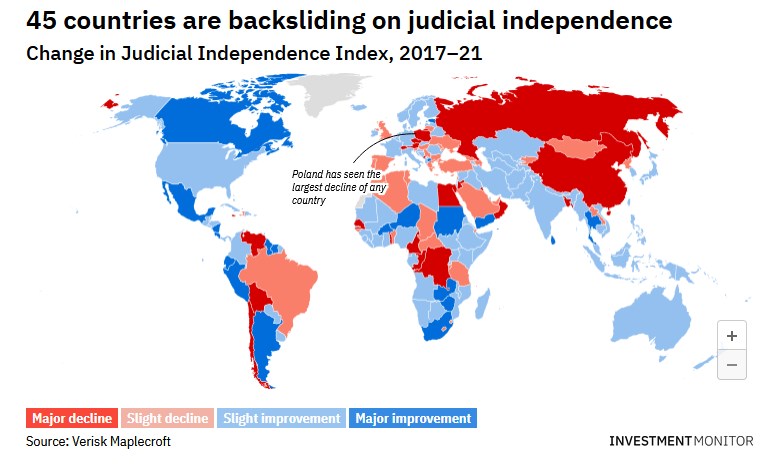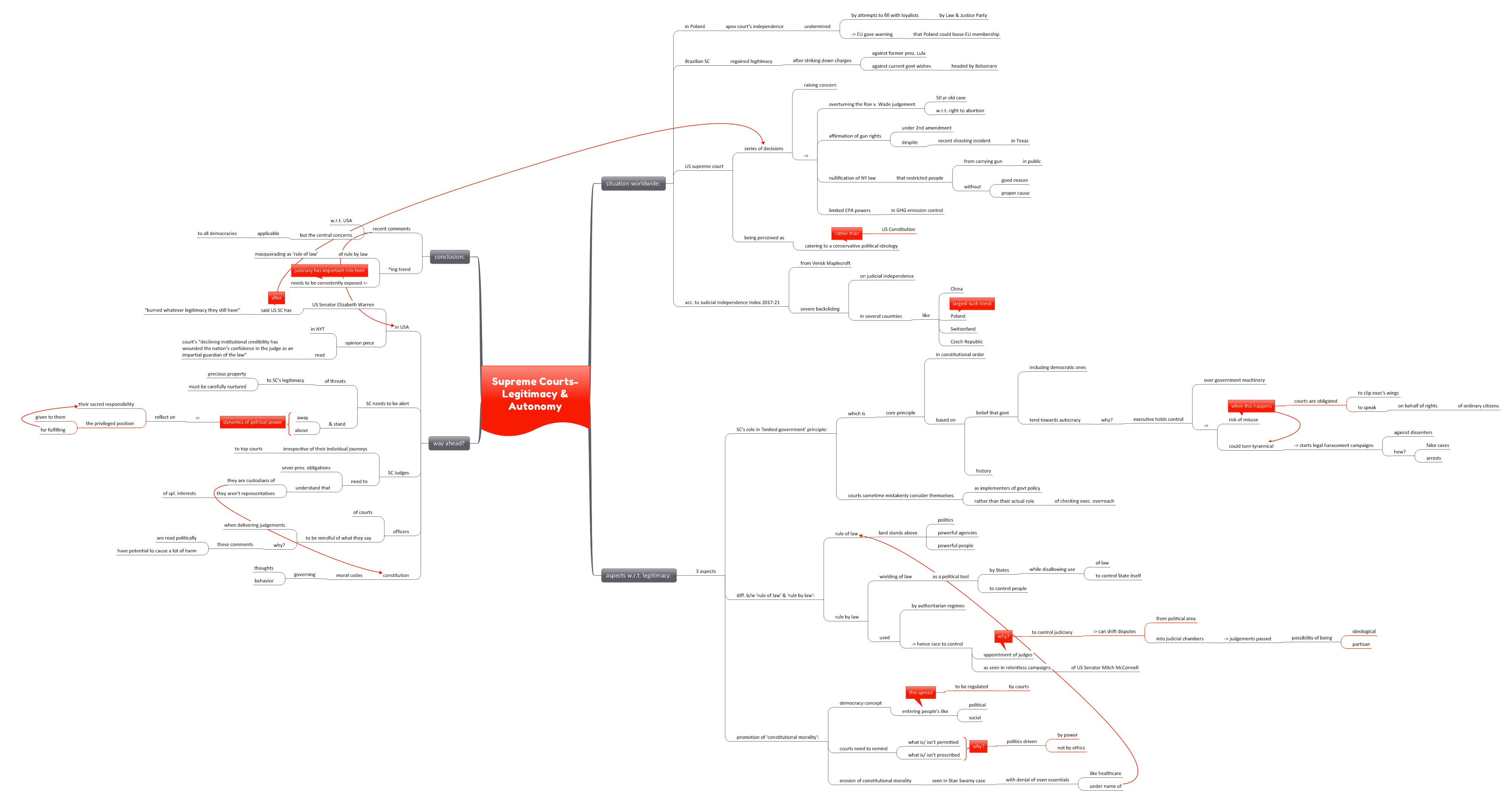Supreme Courts- Legitimacy and Autonomy

From Current Affairs Notes for UPSC » Editorials & In-depths » This topic
IAS EXPRESS Vs UPSC Prelims 2024: 85+ questions reflected
What is the situation across the world?
A survey of democracies shows the centrality of the issue of ‘declining legitimacy of Supreme Court’ in various countries:
- In Poland, the Law and Justice Party have been attempting to undermine the country’s apex court’s independence by filling it with loyalists. These attempts led the EU to warn the Polish government of its risk of losing EU membership.
- The Brazilian Supreme Court regained some legitimacy after striking down charges against former President Lula– against the wishes of the incumbent Bolsonaro government.
- In USA, a series of decisions, have been eroding the apex court’s legitimacy-
- The overturning the Roe v. Wade judgement (the 50 year old ruling on right to abortion)
- The affirmation of gun rights (under the 2nd Amendment) despite the recent shooting incident in Texas
- The nullification of a New York legislation restricting individuals from carrying a gun in public without ‘good reason’ or ‘proper cause’
- Limiting the EPA (Environment Protection Agency) powers in reducing GHG emission
- The US court is being perceived as catering to a conservative political ideology, rather than the US Constitution.
- Verisk Maplecroft, a global risk and strategic consultancy, highlighted several countries witnessing severe backsliding with respect to judicial independence.
What are the aspects to be considered with respect to legitimacy?
3 aspects must be considered on the question of a Supreme Court’s legitimacy:
- SC’s role in enforcing the ‘limited government’ principle.
-
- This is the core principle in any constitutional order.
- It is based on the belief that governments, including democratically elected ones, have a tendency to slide towards autocracy. This has been the case historically too.
- This happens because the executive holds the controls over the government machinery and tends to misuse it.
- In such cases, the court is obligated to clip the executive’s wings and speak on behalf of ordinary citizens’ rights.
- When the executive turns tyrannical and starts a legal harassment campaign against dissenters– by filing false cases and arresting such dissenters- the SC’s duty is to call such tyranny out.
- Courts sometimes mistakenly consider themselves to be the implementers of government policy. Their actual role is to check executive overreach.
- Recognition and endorsement of the fundamental difference between ‘rule by law’ and ‘rule of law’.
-
- Rule of law means that law should stand above politics, every powerful agency and person in the land.
- Rule by law refers to the wielding of the law as a political tool. The State uses it as a tool to control its people while making sure that it isn’t used to control the State itself.
- Rule by law is what is used by authoritarian regimes. Hence, such governments seek to control the appointment of judges.
- If such governments are able to control the judiciary, they could shift a dispute from the political arena into the judicial cambers. When this happens, there is a high likelihood of the courts passing judgements that are ideological and partisan.
- This game plan can be observed in US Senator Mitch McConnell’s relentless campaigns for appointments to the country’s top court.
- SC’s role in promoting ‘constitutional morality’
-
- As the concept of democracy enters people’s social and political life, the court needs to regulate this spread.
- It needs to remind politics of what is and isn’t permitted and what is and isn’t proscribed. This is especially necessary as politics is driven by power– not ethics.
- An erosion of ‘constitutional morality’ was recently seen in the case of Stan Swamy, who was denied even the essentials, like healthcare, under the name of ‘rule of law’.
What is the way ahead?
- Recently, US Senator Elizabeth Warren declared that the US Supreme Court had “burned whatever legitimacy they still have”. This comment followed the recent series of judgements from the court.
- An opinion piece in The New York Times read, the court’s “declining institutional credibility has wounded the nation’s confidence in the judge as an impartial guardian of the law”.
- Legitimacy of Supreme Court is precious property which must be carefully nurtured.
- Supreme Courts needs to be alert about the various threats to legitimacy. They need to stand away and above the dynamics of political power. They need to reflect on their sacred responsibility and the privileged position given to them to perform their duty.
- Irrespective of the individual judges journey to the countries’ top courts, their arrival requires them to sever the previous obligations. This is because, they are now the custodians of the Constitutions– not some representatives of special interests.
- Officers of the court must be mindful of what they say when delivering judgements. These comments are read politically and have potential to cause a lot of harm.
- Constitutions are the moral codes governing our thought and behaviour. They aren’t merely paper documents.
Conclusion:
While the recent comments concern the USA, the central concern is applicable to all democracies today. There is a rising trend of ‘rule by law’ masquerading as ‘rule of law’. This needs to be consistently exposed and the judiciary has a key role in it.
Practice Question for Mains
Why is there a concern over Supreme Courts losing legitimacy worldwide? What can be done to address this? (250 words)
If you like this post, please share your feedback in the comments section below so that we will upload more posts like this.



